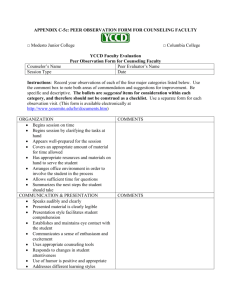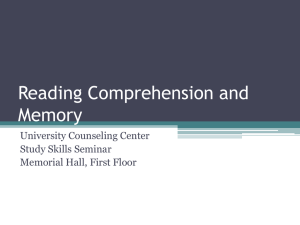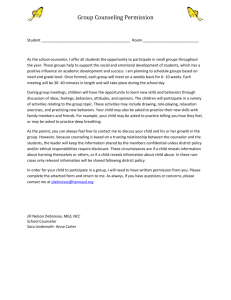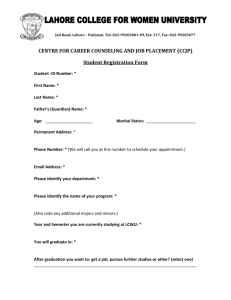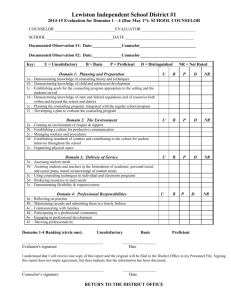School Counselor Self-Efficacy Scale Questionnaire
advertisement
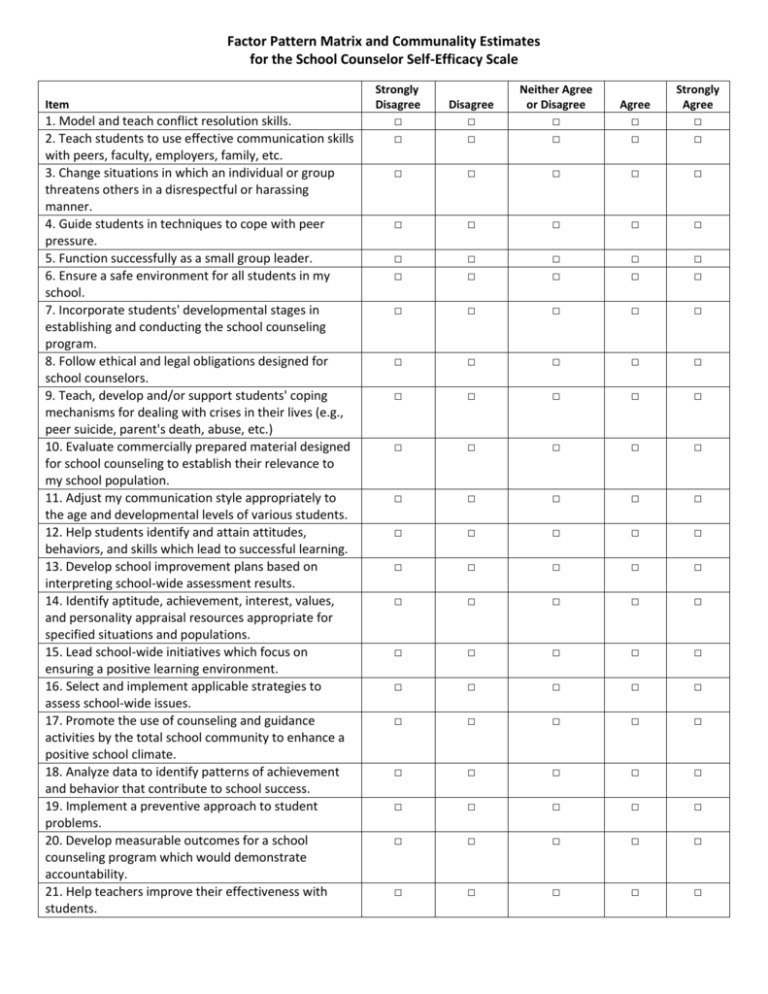
Factor Pattern Matrix and Communality Estimates for the School Counselor Self-Efficacy Scale Item 1. Model and teach conflict resolution skills. 2. Teach students to use effective communication skills with peers, faculty, employers, family, etc. 3. Change situations in which an individual or group threatens others in a disrespectful or harassing manner. 4. Guide students in techniques to cope with peer pressure. 5. Function successfully as a small group leader. 6. Ensure a safe environment for all students in my school. 7. Incorporate students' developmental stages in establishing and conducting the school counseling program. 8. Follow ethical and legal obligations designed for school counselors. 9. Teach, develop and/or support students' coping mechanisms for dealing with crises in their lives (e.g., peer suicide, parent's death, abuse, etc.) 10. Evaluate commercially prepared material designed for school counseling to establish their relevance to my school population. 11. Adjust my communication style appropriately to the age and developmental levels of various students. 12. Help students identify and attain attitudes, behaviors, and skills which lead to successful learning. 13. Develop school improvement plans based on interpreting school-wide assessment results. 14. Identify aptitude, achievement, interest, values, and personality appraisal resources appropriate for specified situations and populations. 15. Lead school-wide initiatives which focus on ensuring a positive learning environment. 16. Select and implement applicable strategies to assess school-wide issues. 17. Promote the use of counseling and guidance activities by the total school community to enhance a positive school climate. 18. Analyze data to identify patterns of achievement and behavior that contribute to school success. 19. Implement a preventive approach to student problems. 20. Develop measurable outcomes for a school counseling program which would demonstrate accountability. 21. Help teachers improve their effectiveness with students. Strongly Disagree Disagree Neither Agree or Disagree Agree Strongly Agree □ □ □ □ □ □ □ □ □ □ □ □ □ □ □ □ □ □ □ □ □ □ □ □ □ □ □ □ □ □ □ □ □ □ □ □ □ □ □ □ □ □ □ □ □ □ □ □ □ □ □ □ □ □ □ □ □ □ □ □ □ □ □ □ □ □ □ □ □ □ □ □ □ □ □ □ □ □ □ □ □ □ □ □ □ □ □ □ □ □ □ □ □ □ □ □ □ □ □ □ □ □ □ □ □ 22. Implement a program which enables all students to make informed career decisions. 23. Deliver age-appropriate programs through which students acquire the skills needed to investigate the world of work. 24. Foster understanding of the relationship between learning and work. 25. Teach students to apply problem-solving skills toward their academic, personal, and career success. 26. Teach students how to apply time and task management skills. 27. Offer appropriate explanations to students, parents, and teachers of how learning styles affect school performance. 28. Use technology designed to support student successes and progress through the educational system. 29. Consult and collaborate with teachers, staff, administrators, and parents to promote student success. 30. Speak in front of large groups such as faculty or parent meetings. 31. Recognize situations that impact (both negatively and positively) student learning and achievement. 32. Effectively deliver suitable parts of the school counseling program through large group meetings such as in classrooms. 33. Conduct interventions with parents, guardians, and families in order to resolve problems that impact students' effectiveness and success. 34. Advocate for integration of student academic, career, and personal development into the mission of my school. 35. Establish rapport with a student for individual counseling. 36. Advocate for myself as a professional school counselor and articulate the purposes and goals of school counseling. 37. Provide resources and guidance to school population in times of crisis. 38. Communicate in writing with staff, parents, and the external community. 39. Consult with external agencies that provide support services for our students. 40. Understand the viewpoints and experiences of students and parents who are from a different cultural background than myself. 41. Counsel effectively with students and families from different social/economic statuses. 42. I can find some way of connecting and communicating with any student in my school. 43. Discuss issues of sexuality and sexual orientation in an age-appropriate manner with students. □ □ □ □ □ □ □ □ □ □ □ □ □ □ □ □ □ □ □ □ □ □ □ □ □ □ □ □ □ □ □ □ □ □ □ □ □ □ □ □ □ □ □ □ □ □ □ □ □ □ □ □ □ □ □ □ □ □ □ □ □ □ □ □ □ □ □ □ □ □ □ □ □ □ □ □ □ □ □ □ □ □ □ □ □ □ □ □ □ □ □ □ □ □ □ □ □ □ □ □ □ □ □ □ □ □ □ □ □ □




